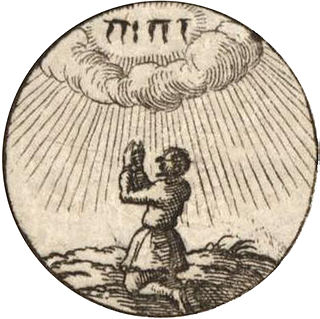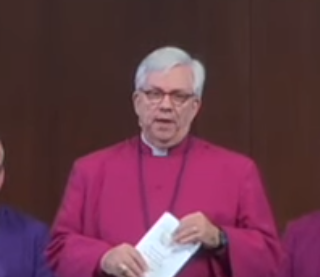
Unitarian Universalism is a liberal religious movement characterized by a "free and responsible search for truth and meaning". Unitarian Universalists assert no creed, but instead are unified by their shared search for spiritual growth. Unitarian Universalists do not have an official, unified corpus of sacred texts but rather draw inspiration and guidance from the six sources: personal experience, prophetic utterances, world religions, Jewish and Christian teachings, humanist teachings, and spiritual teachings. Unitarian Universalist congregations include many atheists, agnostics, deists, and theists; there are churches, fellowships, congregations, and societies around the world.

The Lutheran Church – Missouri Synod (LCMS), also known as the Missouri Synod, is a traditional, confessional Lutheran denomination in the United States. With 1.8 million members, it is the second-largest Lutheran body in the United States, behind the Evangelical Lutheran Church in America. The LCMS was organized in 1847 at a meeting in Chicago, Illinois, as the German Evangelical Lutheran Synod of Missouri, Ohio, and Other States, a name which partially reflected the geographic locations of the founding congregations.
Laestadianism, also known as Laestadian Lutheranism and Apostolic Lutheranism, is a pietistic Lutheran revival movement started in Sápmi in the middle of the 19th century. Named after Swedish Lutheran state church administrator and temperance movement leader Lars Levi Laestadius, it is the biggest pietistic revivalist movement in the Nordic countries. It has members mainly in Finland, Northern America, Norway, Russia and Sweden. There are also smaller congregations in Africa, South America and Central Europe. In addition Laestadian Lutherans have missionaries in 23 countries. The number of Laestadians worldwide is estimated to be between 144,000 and 219,000.

The priesthood of all believers or universal priesthood is a biblical principle in Protestant branches of Christianity which is distinct from the institution of the ministerial priesthood found in some other branches, including the Roman Catholic and Eastern Orthodox. Derived from the Bible and elaborated in the theology of Martin Luther and John Calvin, the principle became prominent as a tenet of Protestant Christian doctrine, though the exact meaning of the belief and its implications vary widely among denominations.

The Feast of the Transfiguration is celebrated by various Christian communities in honor of the transfiguration of Jesus. The origins of the feast are less than certain and may have derived from the dedication of three basilicas on Mount Tabor. The feast was present in various forms by the 9th century, and in the Western Church was made a universal feast celebrated on 6 August by Pope Callixtus III to commemorate the raising of the siege of Belgrade (1456).

The cell group is a form of church organization that is used in many Christian churches. Cell groups are generally intended to teach the Bible and personalize Christian fellowship. They are always used in cell churches, but also occur in parachurch organizations and other interdenominational settings, where they are usually referred to as such as Bible study groups. In Methodism, they are known as class meetings and are a means of grace; in Catholicism, they are known as basic ecclesial communities.

John J. McNeill was an American Catholic priest, psychotherapist and academic theologian in the United States, with a particular reputation within the field of queer theology. McNeill was awarded the National Human Rights Award in 1984 for his contributions to lesbian and gay rights, and was made the Grand Marshal of the New York City Gay Rights Parade in 1987. McNeill was expelled from the Society of Jesus in 1987 at the request of the Vatican, but continued to serve as a Catholic priest in New York City until his death on September 22, 2015.
The Divine Service is a title given to the Eucharistic liturgy as used in the various Lutheran churches. It has its roots in the Pre-Tridentine Mass as revised by Martin Luther in his Formula missae of 1523 and his Deutsche Messe of 1526. It was further developed through the Kirchenordnungen of the sixteenth and seventeenth centuries that followed in Luther's tradition.

Paula Michelle White-Cain is an American televangelist and a proponent of prosperity theology.
Trinity United Church of Christ is a predominantly African-American church with more than 8,500 members. It is located in the Washington Heights community on the South Side of Chicago. It is the largest church affiliated with the United Church of Christ, a predominantly white Christian denomination with roots in Congregationalism, which historically branched from early American Puritanism.
In Lutheranism, the Eucharist refers to the liturgical commemoration of the Last Supper. Lutherans believe in the real presence of Christ in the Eucharist, affirming the doctrine of sacramental union, "in which the body and blood of Christ are truly and substantially present, offered, and received with the bread and wine."
Lutheranism is a major branch of Protestantism, identifying primarily with the theology of Martin Luther, the 16th-century German monk and reformer whose efforts to reform the theology and practices of the Catholic Church launched the Protestant Reformation.

The Church of the Transfiguration is a Roman Catholic parish located at 25 Mott Street on the northwest corner of Mosco Street in the Chinatown neighborhood of Manhattan, New York City. The parish is under the authority of the Archdiocese of New York and is staffed by the Maryknoll order.

St. Paul Lutheran Church is located in central, Davenport, Iowa, United States. It is affiliated with the Evangelical Lutheran Church in America (ELCA). The church's original property, which subsequently housed other Protestant congregations, was listed on the National Register of Historic Places in 1983, but has since been torn down. The present complex was built in 1952 and contains two buildings that are contributing properties in the Vander Veer Park Historic District. The present church building was completed in 2007.
The Church of Christ the King is a Roman Catholic parish church under the authority of the Roman Catholic Archdiocese of New York, located at Grand Concourse at Marcy Place, Bronx, New York City.

Nadia Bolz-Weber is an American author, Lutheran minister and public theologian. She served as the founding pastor of House for All Sinners and Saints, a congregation of the Evangelical Lutheran Church in America in Denver, Colorado, until July 8, 2018.

The Saxon Lutheran immigration of 1838–39 was a migration of Confessional German Lutherans seeking religious freedom in the United States in the early 19th century. The immigrants were among the original founders of the Lutheran Church–Missouri Synod.

The Swedish Pentecostal Movement is a Pentecostal movement in Sweden. Many, but not all, of these, are members of the Pentecostal Alliance of Independent Churches, which was founded in 2001. The Pentecostal movement spread to Sweden by 1907 from the 1904–1905 Welsh Revival and the Azusa Street Revival in Los Angeles in 1906.

Church membership, in Christianity, is the state of belonging to a local church congregation, which in most cases, simultaneously makes one a member of a Christian denomination and the universal Christian Church. Christian theologians have taught that church membership is commanded in the Bible. The process of becoming a church member varies based on the Christian denomination. Those preparing to become full members of a church are known variously as catechumens, candidates or probationers depending on the Christian denomination and the sacramental status of the individual.

Clark Wallace Paul Lowenfield is an American Anglican bishop. Since 2013, he has been the first diocesan bishop of the Anglican Diocese of the Western Gulf Coast, which has jurisdiction in southeast Texas and Louisiana, in the Anglican Church in North America.














